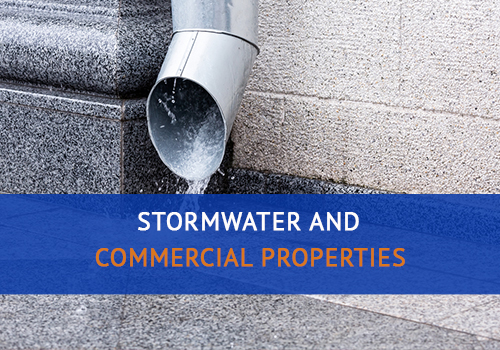As we approach Florida’s rainy season, it’s essential to consider the impact of stormwater and how to manage it.
After a storm, the rainwater needs to be absorbed back into the environment. Usually, this happens through ground absorption, and in natural landscapes, this stormwater nourishes plants and animals while replenishing ground water. However, the runoff from an urban environment and commercial buildings is much different in that it picks up pollutants and debris on its way back into surrounding bodies of water. This can be an issue because untreated urban stormwater can impact the environment negatively. All of these things mean handling stormwater and commercial properties take some preparation and work.

Stormwater and Commercial Properties
If you own a commercial property, then you know that it can be a busy place. Not only does your establishment see a lot of foot traffic, but it also sees a large amount of literal traffic.
Parking lots mean cars. Cars can leave oils and bring other sediments into the parking lot. When stormwater washes over these pollutants, it carries harmful materials back into the local environment.
However, why is that concerning? Also, is there anything you can do with the storm runoff at your commercial building?
Why is Stormwater a Concern?
- The stormwater that runs off into local water bodies can contaminate the local water supply.
- The pollutants in commercial property runoff can harm the organisms and wildlife in a and around local water sources. Eventually, this water can make its way to the ocean, causing an even more significant environmental impact (https://advancedsepticservicesfl.com/national-estuary-program-florida/).
- If a lake or beach becomes too polluted, local authorities can restrict activities like swimming and boating.
- Inability to manage stormwater overtime can wreak havoc on sewer systems. Failing sewer systems also pose a threat to environmental health.
Debris and pollutants in stormwater can be a multitude of things. Take a look at the list below to understand how quickly urban stormwater can get out of control.
Commercial Site Pollutants
- Chemicals, like motor oils and gasoline
- Plastics, Styrofoam, and rubbers
- Animal waste
- Yard or agricultural waste, like fertilizers, pesticides, and debris
- Kitchen products, like cook oils, fats, and food scraps
- Industrial products, like bleach and paint
- Septic waste, which can contain raw sewage and harmful bacteria
- Trash/Litter
The list of commercial property pollutants can go on and on. It’s easy to see how these harmful items can build up quickly. So, how do you know what issues or warning signs you might need to look for?
Concerns with Stormwater and Commercial Properties
First off, you should take a look at your commercial property, and how many of its surfaces are impermeable pavement. If stormwater doesn’t appear to have an easy path back into the ground, the runoff will find another way. However, first, the water has to wash over the impervious surfaces, picking up contaminants.
Luckily, there are ways for you to control your commercial property’s stormwater impact. You have to follow a few simple tips.
Ways to Reduce Stormwater Runoff
- Never, ever dump anything into a storm drain.
- If you can, direct your gutters and rain-spouts away from impermeable surfaces. It would help if you pointed these towards the natural ground.
- Clean out drainage systems often. This way they cannot collect debris that will flush into the local water sources.
- Keep trash, debris, and yard waste from floating away with stormwater.
Second, consider what happens to the stormwater from your commercial property. The runoff could end up leaving your commercial property through a storm drain. The rainwater could find its way to a local pond or open field, meaning that the contaminated water seeps back into the environment.
You can be more involved in managing your commercial properties storm runoff by installing stormwater management systems.
Different Types of Stormwater Management
According to the Florida Department of Environmental Protection, there are two types of stormwater management systems.
1. Retention Systems
These types of systems are designed to collect stormwater runoff and facilitate its natural reabsorption into the ground. Many of these systems are designed with a system to filter the water.
2. Detention Systems
In this type of a system, rainwater is collected and detained to allow the debris and pollutants to settle. After these sediments fall, the runoff is then gradually let back into the surrounding ground. Sometimes detention systems can be holding ponds, which use vegetation to filter floating particles.
To implement a stormwater management plan on your property, the Florida Department of Environment Protection requires an Environmental Resource Permit (ERP). Also, of course, this change to your commercial property comes with several regulations. Therefore, it’s essential and easier on you to hire a trusted professional to install a retention or detention system to manage your commercial property’s stormwater runoff.
At Advanced Septic Services, we provide an affordable solution to stormwater with a chamber system through StormTech. StormTech technology is designed to use space efficiently by installing the system under parking lots and roadways. It uses the earth’s natural percolation processes to release stormwater back into the ground in an easy, efficient, and environmentally friendly process. The systems are made of semi-circular chambers, which create a tunnel-like structure that capture the filter the rainwater as it enters the system. The system then separates sediments and retains the water until it naturally absorbs back into the ground.
If you have questions about what you can do to manage the stormwater on your commercial property better or would like to know more about our services with StormTech, reach out to us. We’d be happy to hear from you.

